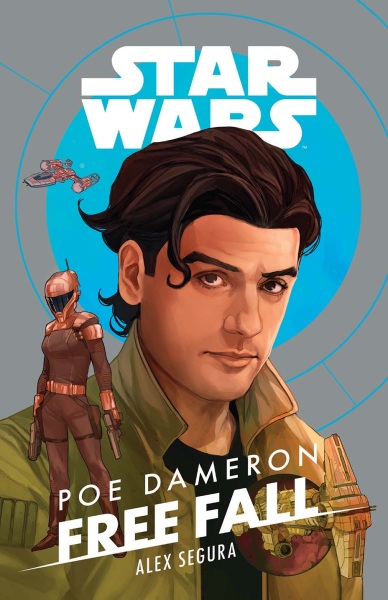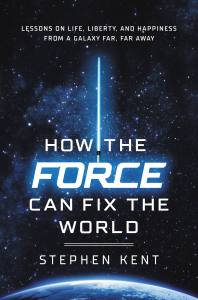I’m a longtime listener of the Beltway Banthas podcast, so I’m familiar with Stephen Kent’s thoughts on the intersection between politics and Star Wars. How the Force Can Fix the World is a distillation of some of his discussions on the podcast. However, it’s probably better to characterize this book as a self-help manual than a political analysis. Howt the Force Can Fix the World does discuss how Star Wars can inform our approach to politics, but more than that it’s about how Star Wars can help us live more mindful lives and become better citizens.
Continue reading “REVIEW: “How the Force Can Fix the World” by Stephen Kent”Category: Books
“Project Hail Mary” by Andy Weir
Andy Weir’s The Martian was one of my favorite books of the past decade. The focus on smart scientists solving hard science problems was both a welcome throwback to the Golden Age of science fiction and a clever new take on the space-disaster genre. I thought Artemis was a bit of a misfire, largely because Weir seemed to struggle writing a female protagonist. Project Hail Mary retains Weir’s trademark glorification of science and scientists, but also differs from his previous two books. It’s a more emotional story and takes some very unexpected turns.
Continue reading ““Project Hail Mary” by Andy Weir”Star Wars: From a Certain Point of View 2
My favorite Star Wars books as a kid were the “Tales of…” series edited by Kevin J. Anderson. Those books imbued the Galaxy Far, Far Away with the sense that Greedo, Dengar, Bib Fortuna, and the hundreds of minor background characters from the films each had stories of their own. Those books – and the fan hunger for more stories – are a major part of the reason why the Star Wars franchise has been able to grow beyond the Skywalker saga through shows like The Mandalorian.
The “From a Certain Point of View” books continue that tradition – but in both more expansive and limited ways. The first book, released in 2017, celebrated the 40th anniversary of A New Hope by collecting stories from a variety of science fiction and fantasy authors. As the title suggests, the stories are told from the point of background characters. This latest volume does the same for The Empire Strikes Back.
Continue reading “Star Wars: From a Certain Point of View 2”“Sharing a House with the Never-Ending Man” by Steve Alpert

During the past few years, I’ve become a fan of Studio Ghibli’s animated movies. I recently decided to learn more about the company and the people behind the films. I’ve read Susan Napier’s Miyazakiworld, which is more of an intellectual biography of Ghibli founder Hayao Miyazaki. Steve Alpert’s Sharing a House with the Never-Ending Man is a peek into the corporate side of the studio, something which doesn’t get as much attention from scholars and fans.
Continue reading ““Sharing a House with the Never-Ending Man” by Steve Alpert”“Star Wars: Queen’s Peril” – by E.K. Johnston

Star Wars: Queen’s Peril is a prequel to E.K. Johnston’s other novel about Padme Amidala, Queen’s Shadow. However, I think this novel works better because it’s an origin story for Padme’s handmaidens. Where Queen’s Shadow seemed to assume we were already invested in the handmaidens, Queen’s Peril shows how and why they came to serve the queen – and therefore make me feel more invested.
Continue reading ““Star Wars: Queen’s Peril” – by E.K. Johnston”“Poe Dameron: Free Fall” by Alex Segura
 “You were a spice runner?”
“You were a spice runner?”
JJ Abrams and Chris Terrio wanted to create conflict between the main characters in The Rise of Skywalker and so gave each one a secret they were hiding. For Poe, this meant he now had a shady past as a drug dealer. This proved controversial. Some fans pointed out that the new backstory seemed to contradict other Star Wars stories about Poe Dameron, such as the novel Before the Awakening. Others noted that making the first Latino lead in the franchise a drug runner played into some unfortunate stereotypes. In the film, Finn and Rey seem to quickly forgive and forget Poe’s shady past, but Alex Segura’s Poe Dameron: Free Fall seems to exist largely to explain this new backstory. Continue reading ““Poe Dameron: Free Fall” by Alex Segura”
“Dragon Age: Tevinter Nights”
 I wouldn’t call myself a hardcore Dragon Age fan, but I enjoyed the first game – later renamed “Origins” – and was sufficiently intrigued by the ending of Dragon Age: Inquisition. The world of Dragon Age is a darker take on Tolkienian epic fantasy. Despite the obvious similarities with The Lord of the Rings – complete with an alliance between men, dwarves, and elves against an army of orcs (called “Darkspawn” in Dragon Age lore) – Dragon Age manages to evoke an illusion of depth. There are realms as interesting as Ferelden just offscreen. Continue reading ““Dragon Age: Tevinter Nights””
I wouldn’t call myself a hardcore Dragon Age fan, but I enjoyed the first game – later renamed “Origins” – and was sufficiently intrigued by the ending of Dragon Age: Inquisition. The world of Dragon Age is a darker take on Tolkienian epic fantasy. Despite the obvious similarities with The Lord of the Rings – complete with an alliance between men, dwarves, and elves against an army of orcs (called “Darkspawn” in Dragon Age lore) – Dragon Age manages to evoke an illusion of depth. There are realms as interesting as Ferelden just offscreen. Continue reading ““Dragon Age: Tevinter Nights””
“Inventing Tomorrow” by Sarah Cole
 I admit I’m probably not the intended audience for this book. I’ve read H.G. Wells’ The Time Machine and War of the Worlds, and I’m very interested in the history of science fiction, but I’m not as well versed in his broader body of work. Sarah Cole’s Inventing Tomorrow is an academic study of Wells’s writing that takes him seriously as an early 20th century author. Not an early 20th century science fiction author – just an author. Continue reading ““Inventing Tomorrow” by Sarah Cole”
I admit I’m probably not the intended audience for this book. I’ve read H.G. Wells’ The Time Machine and War of the Worlds, and I’m very interested in the history of science fiction, but I’m not as well versed in his broader body of work. Sarah Cole’s Inventing Tomorrow is an academic study of Wells’s writing that takes him seriously as an early 20th century author. Not an early 20th century science fiction author – just an author. Continue reading ““Inventing Tomorrow” by Sarah Cole”
“Alien Vault” by Ian Nathan

I discussed Alien, Ridley Scott’s seminal science fiction masterpiece, on a Mythgard podcast last year. Alien is one of my favorite films. No matter how many times I watch the film, I can’t help but be drawn into Scott’s dark, dreary vision of our future. Like Star Wars, another science fiction classic from that era, the story behind the scenes is almost as interesting as the film itself. In Alien Vault, Ian Nathan chronicles what it took to make a film unlike anything else before or since. Continue reading ““Alien Vault” by Ian Nathan”
“George Orwell: A Life” by Bernard Crick

The name “Orwell” is more closely associated with dystopia visions of the future than with a man who lived and breathed. Ever since the publication of 1984, we’ve used the term “Orwellian” to describe suffocating oppression in totalitarian regimes. Yet, George Orwell’s life and political philosophy was more than a condemnation of totalitarianism, as notable as that condemnation was. Bernard Crick’s biography of Orwell – the first of its kind when it was published in 1980 – attempts to understand the man and his works. Continue reading ““George Orwell: A Life” by Bernard Crick”



